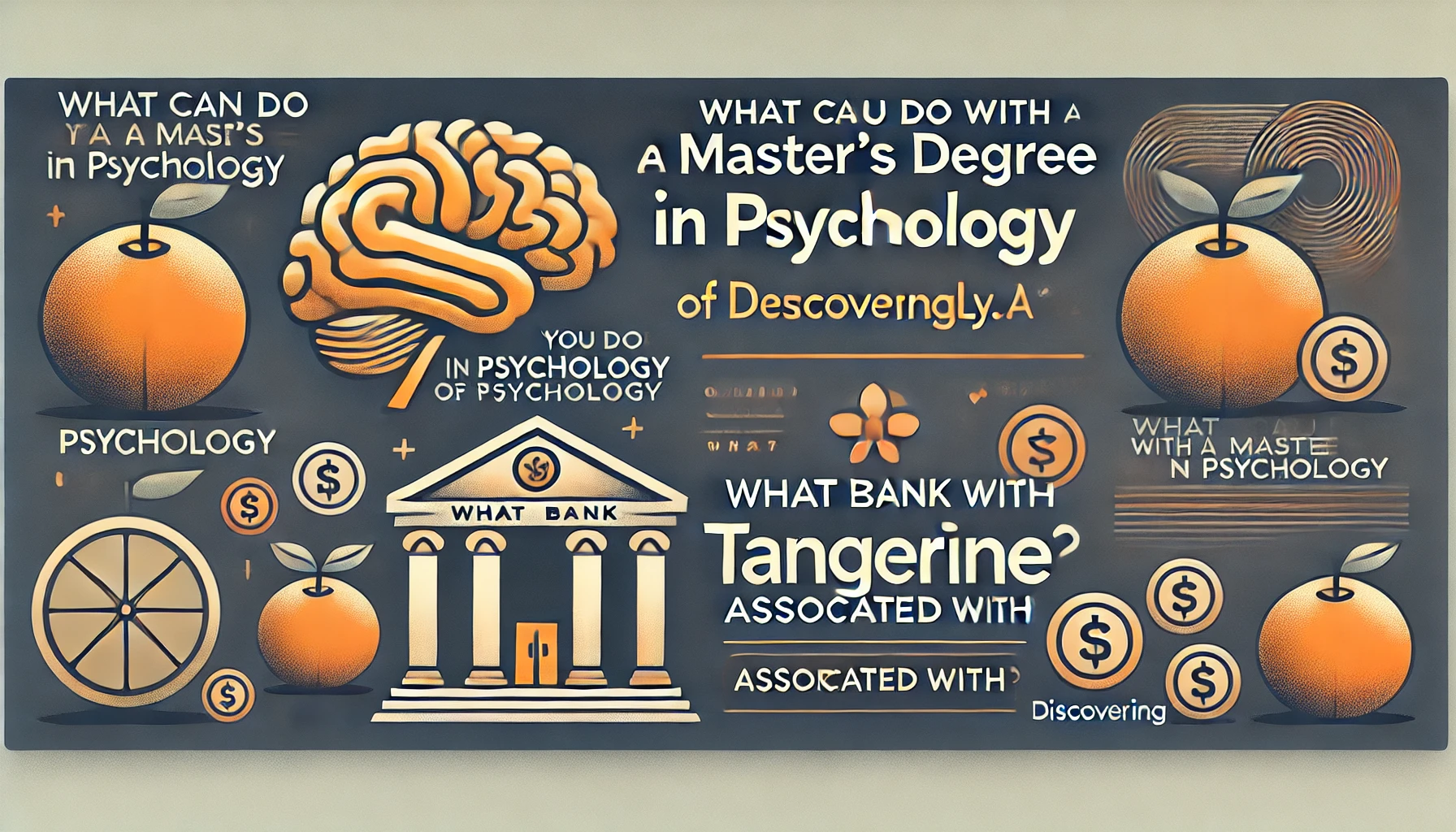What Can You Do with a Master’s Degree in Psychology? Career Paths and Opportunitie
Introduction
A Master’s Degree in Psychology opens up a world of opportunities across various fields, from mental health services to business consulting. While many people associate psychology with clinical practice, this versatile degree provides skills that are highly sought after in research, education, healthcare, and corporate environments. If you’ve completed or are considering a Master’s in Psychology, this article will guide you through the career paths, industries, and growth potential that this degree offers.
What Is a Master’s Degree in Psychology?
A Master’s Degree in Psychology is a graduate-level program designed to deepen your understanding of human behavior, thought processes, and emotional dynamics. It bridges the gap between undergraduate education and more advanced doctoral training while equipping graduates with specialized skills applicable to a variety of professional contexts.
Common Specializations:
- Clinical Psychology: Focused on diagnosing and treating mental health disorders.
- Industrial-Organizational Psychology: Explores workplace behavior and organizational effectiveness.
- Educational Psychology: Concentrates on improving learning and developmental outcomes.
- Forensic Psychology: Applies psychological principles in legal and criminal justice settings.
Career Opportunities with a Master’s in Psychology
A Master’s in Psychology offers diverse career paths, enabling graduates to work in fields ranging from mental health to corporate leadership. Here’s an overview of the top career options:
1. Mental Health and Counseling
Graduates can work in mental health and counseling roles, supporting individuals with emotional, behavioral, or psychological challenges.
- Roles:
- Mental Health Counselor
- Marriage and Family Therapist (additional licensure may be required)
- Rehabilitation Specialist
- Work Settings:
- Community health centers
- Private practices
- Hospitals
- Key Skills:
- Active listening, empathy, and the ability to create individualized treatment plans.
2. Research and Academia
For those interested in advancing the field of psychology, research and academic roles are ideal.
- Roles:
- Research Assistant
- Behavioral Scientist
- Psychology Instructor (at community colleges)
- Work Settings:
- Universities
- Government agencies
- Research institutions
- Key Skills:
- Data analysis, research design, and academic writing.
3. Industrial-Organizational Psychology
Industrial-organizational psychologists apply psychological principles to improve workplace productivity and employee satisfaction.
- Roles:
- Human Resources Consultant
- Organizational Development Specialist
- Training and Development Manager
- Work Settings:
- Corporations
- Consulting firms
- Nonprofit organizations
- Key Skills:
- Employee assessment, conflict resolution, and team dynamics.
4. Education and School Psychology
Psychology graduates play a vital role in educational settings, helping students and teachers achieve their full potential.
- Roles:
- School Counselor
- Educational Consultant
- Learning Specialist
- Work Settings:
- Schools and universities
- Educational agencies
- Tutoring organizations
- Key Skills:
- Understanding developmental psychology, creating intervention plans, and supporting diverse learning needs.
5. Healthcare and Social Services
In healthcare, psychology graduates can work to improve patient care and support vulnerable populations.
- Roles:
- Behavioral Health Specialist
- Case Manager
- Patient Advocate
- Work Settings:
- Hospitals
- Rehabilitation centers
- Social service agencies
- Key Skills:
- Crisis intervention, care coordination, and a deep understanding of health psychology.
6. Marketing and Market Research
Psychology’s insights into human behavior are invaluable in marketing, where understanding consumer habits is crucial.
- Roles:
- Market Research Analyst
- Consumer Behavior Specialist
- Brand Consultant
- Work Settings:
- Advertising agencies
- E-commerce platforms
- Media firms
- Key Skills:
- Data analysis, communication strategies, and consumer psychology.
Advantages of a Master’s Degree in Psychology
Earning a Master’s Degree in Psychology provides several benefits, enabling personal and professional growth:
1. Specialization Opportunities
- Allows graduates to focus on their preferred areas, such as counseling, organizational psychology, or research.
2. Career Flexibility
- Opens doors to various industries, including healthcare, education, and business.
3. Increased Earning Potential
- Typically leads to higher salaries compared to bachelor’s degree holders.
4. Foundation for Further Education
- Prepares graduates for pursuing a Ph.D. or Psy.D. for advanced roles in clinical or academic settings.
5. In-Demand Skills
- Enhances interpersonal, analytical, and communication skills that are valuable across professions.
Challenges to Consider
While a Master’s in Psychology offers many opportunities, there are challenges to keep in mind:
1. Licensure Requirements
- Some roles, such as clinical psychologist or licensed therapist, require additional certifications or doctoral degrees.
2. Competitive Job Market
- High demand for roles in mental health and academia can make securing jobs competitive.
3. Limited Clinical Authority
- A master’s degree may not provide the full credentials needed for independent practice in some areas.
4. Time and Financial Investment
- Completing a graduate program requires significant dedication and resources.
How to Advance Your Career with a Master’s in Psychology
Graduates can take several steps to maximize their career potential:
1. Pursue Certifications
- Obtain certifications in specialized areas, such as cognitive behavioral therapy (CBT) or industrial-organizational psychology.
2. Build a Network
- Join professional organizations like the Canadian Psychological Association (CPA) to connect with peers and mentors.
3. Gain Practical Experience
- Internships, volunteer work, or entry-level roles can provide hands-on experience and improve employability.
4. Consider Doctoral Programs
- Earning a Ph.D. or Psy.D. can lead to advanced roles, such as licensed psychologist or university professor.
Real-Life Applications and Success Stories
Graduates with a Master’s in Psychology have succeeded in various industries:
- Mental Health Services:
- Counselors helping clients navigate life challenges and improve well-being.
- Corporate Leadership:
- Organizational psychologists fostering positive workplace cultures.
- Cutting-Edge Research:
- Researchers contributing to breakthroughs in understanding human behavior.
Frequently Asked Questions
1. Can I become a licensed psychologist with a master’s degree?
- In Canada, becoming a licensed psychologist generally requires a doctoral degree and provincial licensure.
2. What’s the difference between an MA and MSc in Psychology?
- An MA focuses on theoretical and qualitative aspects, while an MSc emphasizes research and quantitative methods.
3. What salary can I expect with a master’s degree in psychology?
- Salaries vary by role and industry, starting at around $50,000 annually and increasing with experience and specialization.
4. Is a Master’s in Psychology worth it?
- Yes, for those passionate about understanding human behavior and pursuing careers in counseling, research, or organizational psychology.
5. What industries hire psychology graduates?
- Industries include healthcare, education, corporate sectors, nonprofit organizations, and marketing.
Conclusion
A Master’s Degree in Psychology unlocks numerous rewarding career opportunities across industries. Whether you’re interested in mental health counseling, academic research, corporate consulting, or education, this degree equips you with the skills to succeed. By exploring specializations, gaining hands-on experience, and pursuing additional certifications, you can maximize your career potential and make a meaningful impact.
For more career advice and insights, visit Discoveringly.ca and start planning your future today.






